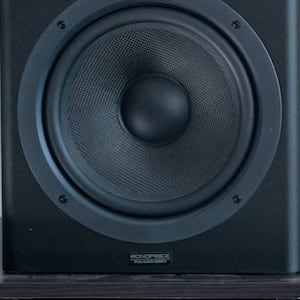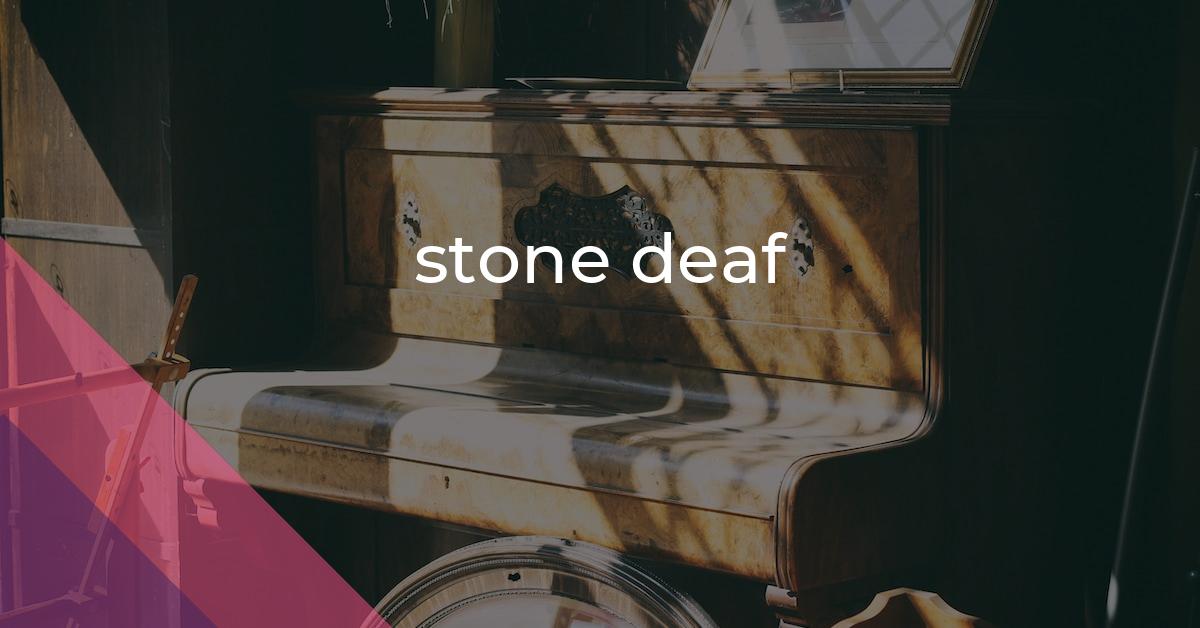stone deaf: Idiom Meaning and Origin
What does ‘stone deaf’ mean?
Stone deaf: Completely unable to hear anything, implying a total and irreversible loss of hearing.

Idiom Explorer
An idiom used to emphasize the extreme or exceptional quality of someone or something.
The idiom "talk to a brick wall" means to speak to someone who is unresponsive or unwilling to listen or understand what you are saying.
The idiom "talk out of one's ear" means to speak dishonestly or talk nonsense, usually with the intention of decieving or misleading others.
The idiom "take no notice of" means to ignore or pay no attention to something or someone. It implies a deliberate act of not acknowledging or responding to a particular situation, remark, or individual.
The idiom "switch off" means to lose interest or become disengaged from something mentally or emotionally, often resulting in a lack of attention or focus.
The idiom "stump it" means to be completely unable to answer a question or solve a problem. It is often used to refer to a situation where someone is left speechless or puzzled, unable to come up with a response or solution.
The idiom "stuck in the Stone Age" means someone is resistant to change and holds outdated beliefs or practices. It metaphorically refers to being trapped in a time period known for primitiveness and lacking modern advancements.
The idiom "stop dead" means to suddenly and completely stop moving or doing something, often due to shock, surprise, or fear.
FAIL
Stone deaf is an idiom that describes someone who is completely unable to hear any sound. The word "stone" emphasizes the degree of deafness, suggesting that their inability to hear is as hard or solid as a stone. This term originated in the early 19th century and has become deeply rooted in the English language. It is used to convey a complete lack of response or understanding and is often applied to individuals who have profound hearing loss or are unable to perceive any sounds.
This idiom, stone deaf, indicates a total and permanent hearing impairment. It highlights the profound nature of deafness, emphasizing the complete absence of hearing in the individual being described. When used figuratively, stone deaf can also imply an unyielding or stubborn manner of not understanding or responding to others.
In everyday language, stone deaf is used to express a complete lack of response or understanding. It can be used to describe someone who seems oblivious to their surroundings, oblivious to the words or concerns of others, or simply unresponsive to sound or communication in general.
It is vital to note that stone deaf pertains to a serious medical condition. It should not be used lightly and must be handled with sensitivity and respect. This idiom highlights the severity and totality of someone's hearing loss, and using it inappropriately can potentially belittle individuals with hearing impairments.
Stone deaf is a powerful expression that communicates the profound and complete nature of someone's inability to hear. It has found its place in both formal and informal contexts, becoming ingrained in the English language. However, it should always be used with caution and recognition of the seriousness of deafness to avoid causing offense to those who experience hearing impairments.
An idiom related to stone deaf is "deafening silence." This phrase is used to describe a silence that is so complete and intense that it feels deafening, as if it could drown out any other sounds. While stone deaf refers to the inability to hear any sounds, deafening silence refers to the absence of any sound at all. It conveys a powerful sense of emptiness and stillness, often in a situation where there should be noise or activity.
Another related idiom is "hard of hearing," which is used to describe individuals who have some degree of hearing loss but are not completely deaf. Unlike stone deaf, this idiom implies a partial hearing impairment rather than a total inability to hear. Being "hard of hearing" means having difficulties hearing certain sounds or frequencies and often requires the use of hearing aids or other assistive devices.
Stone deaf is an idiom that signifies a complete lack of hearing or understanding. It is often used to describe individuals who have profound hearing loss or are unable to perceive any sounds. This idiom originated in the early 19th century and has become deeply rooted in the English language. It is important to use the term with sensitivity and respect, recognizing the seriousness of deafness and avoiding any potential offense towards those with hearing impairments. The related idioms "deafening silence" and "hard of hearing" emphasize different aspects of impaired hearing. Deafening silence conveys a sense of complete silence, while hard of hearing describes a partial hearing impairment. Both idioms enrich our understanding of the various degrees and experiences of hearing loss.
Example usage
Examples of how the idiom "stone deaf" can be used in a sentence:
- Despite shouting at the top of her lungs, Anna realized that her grandmother, who was stone deaf, could not hear a word.
- The concert was so loud that even though John was sitting right next to the speakers, he felt temporarily stone deaf afterwards.
- After years of exposure to loud music without ear protection, Dave had become stone deaf and now relied on sign language to communicate.
More "Hearing" idioms
We missed the mark - nothing found.



